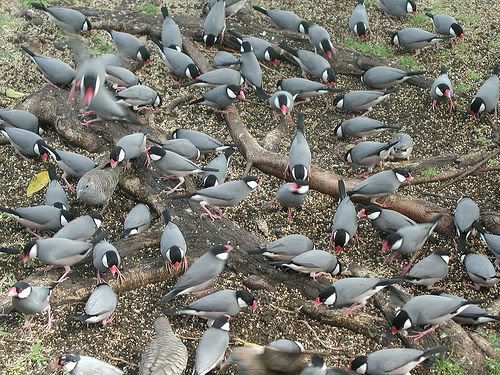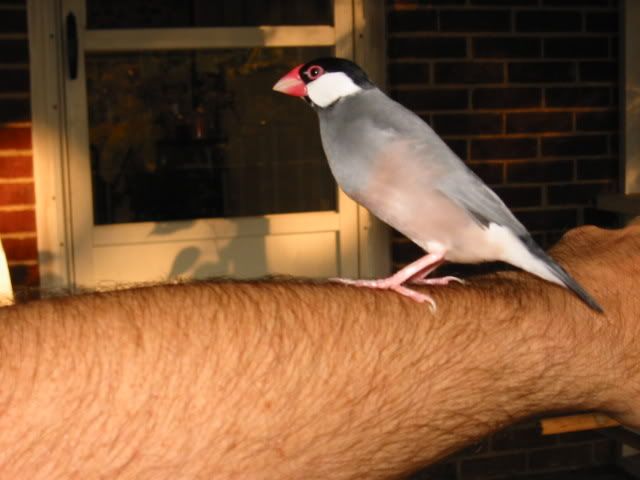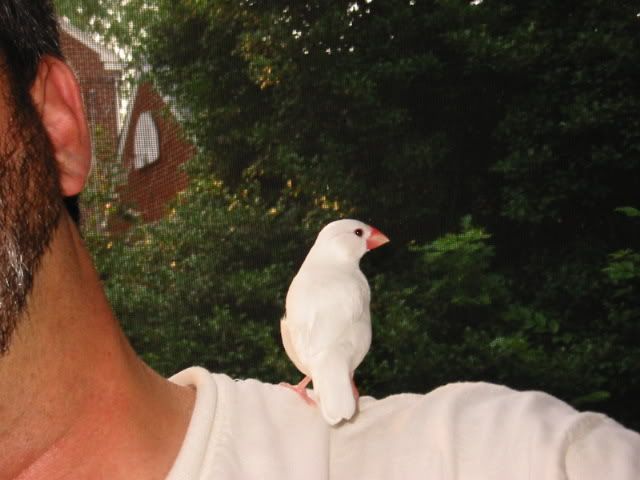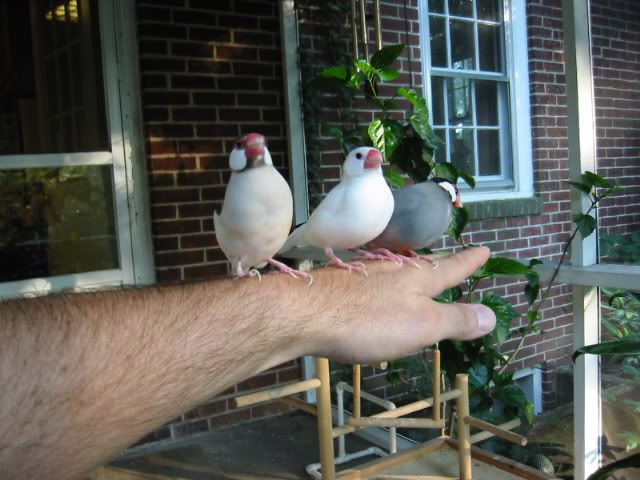Java sparrow.
-
Firingo
- Hatchling

- Posts: 32
- Joined: Fri Jul 09, 2010 8:49 am
- Location: Homestead. Florida
- Contact:
Java sparrow.
Hello.
Why These birds are illegal to keep in some states, I live in Florida.
Thans.
Why These birds are illegal to keep in some states, I live in Florida.
Thans.
- CandoAviary
- Good Egg

- Posts: 8554
- Joined: Mon Feb 23, 2009 5:21 pm
- Location: Panama City Beach, FL
- Contact:
Re: Java sparrow.
They are considered a pest. They breed easily, have a voracious appetite, and can adapt to many temperatures and comditions. Some states fear tht if they were to escape an aviary, or worse, be released by owners who no longer want them then the birds could do mass damage to corn, rice, wheat, etc. crops. They also would really hurt the natural bird by competing for their territory/food.
Candace
My Aviary http://www.candoaviary.com
My Store http://www.cagebirdmenagerie.com
Facebook Store http://www.facebook.com/#!/pages/Cage-B ... 3059529986
My Aviary http://www.candoaviary.com
My Store http://www.cagebirdmenagerie.com
Facebook Store http://www.facebook.com/#!/pages/Cage-B ... 3059529986
-
Firingo
- Hatchling

- Posts: 32
- Joined: Fri Jul 09, 2010 8:49 am
- Location: Homestead. Florida
- Contact:
Re: Java sparrow.
Thanks.
-
Firingo
- Hatchling

- Posts: 32
- Joined: Fri Jul 09, 2010 8:49 am
- Location: Homestead. Florida
- Contact:
Re: Java sparrow.
But, we can keep here in Florida right??
Thanks.
Thanks.
- CandoAviary
- Good Egg

- Posts: 8554
- Joined: Mon Feb 23, 2009 5:21 pm
- Location: Panama City Beach, FL
- Contact:
Re: Java sparrow.
Yes, Florida is a legal state....... I guess the java's aren't much of a threat to our orange trees 
At the Orlando show I saw all colors of javas.... they were like $20 each They are pretty and very smart birds. I don't have any now but use to raise the cinnamon and normal colors. Smartest birds I have seen in the finch size catagory. They make great pets.
They are pretty and very smart birds. I don't have any now but use to raise the cinnamon and normal colors. Smartest birds I have seen in the finch size catagory. They make great pets.
I may get a pair again because I enjoyed them so much.
At the Orlando show I saw all colors of javas.... they were like $20 each
I may get a pair again because I enjoyed them so much.
Candace
My Aviary http://www.candoaviary.com
My Store http://www.cagebirdmenagerie.com
Facebook Store http://www.facebook.com/#!/pages/Cage-B ... 3059529986
My Aviary http://www.candoaviary.com
My Store http://www.cagebirdmenagerie.com
Facebook Store http://www.facebook.com/#!/pages/Cage-B ... 3059529986
-
avicella
- Pip

- Posts: 24
- Joined: Tue Apr 06, 2010 9:36 pm
- Location: Saitama, Japan
Re: Java sparrow.
I wonder how much of a threat they really are. Here in Japan they have been kept as cage birds for at least 150 years, because the local museum has paintings that old that show them in the background or sitting on ladies' shoulders. And yet rice is a critically important crop in Japan.
They're not considered able to cope with Japan's weather that well, which is not really all that cold, but Javas are originally tropical and don't like temperatures below about 19 centigrade. You need cage heaters in winter in the Tokyo area if you don't keep your rooms warm at night. In Hawaii they have gone feral though, with large flocks on Oahu.
They're not considered able to cope with Japan's weather that well, which is not really all that cold, but Javas are originally tropical and don't like temperatures below about 19 centigrade. You need cage heaters in winter in the Tokyo area if you don't keep your rooms warm at night. In Hawaii they have gone feral though, with large flocks on Oahu.
Bought my first pet birds, 2 Java sparrow chicks, on March 15, 2010
- Nipper06
- Novice Nester

- Posts: 446
- Joined: Thu Oct 04, 2007 10:49 pm
- Location: Wilmington, Delaware (USA)
Re: Java sparrow.
I think the threat of Java Sparrows, as a pest in anything other than tropical rice-growing climates, is way over-stated. They've been kept as pets for many decades in the U.S. and the only place they've ever become established is Hawaii - which, with a mild climate, little competition, and few predators, is a very easy place for exotic birds to become established. There are all kinds of exotic finches living in Hawaii (including Green Singers, Spice Finches, other Munias, Lavender Finches, Strawberries, etc). I think Java Sparrows are in Puerto Rico too, but again, it's a tropical island ecosystem with a mild climate and few predators (and there are other x-cagebirds flying around there too).
Consider, Java Sparrows were breeding in the Miami area for a few years but even there, they did not become established - and they certainly never spread out beyond the human-influenced suburbs. Miami's climate was not too cold for them but maybe even there, they could not compete with native birds.
So I think the fear of Java Sparrows (as pests in the U.S. anyway) is way over-blown. And as they get more and more domesticated through captive-breeding, the likelihood of them establishing in the wild is reduced with each generation. The ones that became established in Hawaii and Puerto Rico in the 1960s were probably original wild-caught birds that could easily survive in the wild, when imports like that were common.
As bird keepers, we need to be responsible and never release non-native birds into the wild. But we also need to keep some of the hysteria in check, as people who don't keep birds try to regulate what we can keep. Very few exotic pet birds have ever become established in the mainland U.S., aside from Florida and parts of California - and even there, they persist in small numbers, usually in bird-friendly suburbs (with bird feeders), not farmlands or the natural environment. The only exotic birds to really take over in the U.S. mainland have been Starlings, House Sparrows, and feral Rock Doves (Pigeons). Of these, only pigeons were x-pets.
In Hawaii, Java Sparrows are quite abundant as "backyard birds" - yet they don't grow rice in Hawaii!

Some of my Javas from years gone by.



Consider, Java Sparrows were breeding in the Miami area for a few years but even there, they did not become established - and they certainly never spread out beyond the human-influenced suburbs. Miami's climate was not too cold for them but maybe even there, they could not compete with native birds.
So I think the fear of Java Sparrows (as pests in the U.S. anyway) is way over-blown. And as they get more and more domesticated through captive-breeding, the likelihood of them establishing in the wild is reduced with each generation. The ones that became established in Hawaii and Puerto Rico in the 1960s were probably original wild-caught birds that could easily survive in the wild, when imports like that were common.
As bird keepers, we need to be responsible and never release non-native birds into the wild. But we also need to keep some of the hysteria in check, as people who don't keep birds try to regulate what we can keep. Very few exotic pet birds have ever become established in the mainland U.S., aside from Florida and parts of California - and even there, they persist in small numbers, usually in bird-friendly suburbs (with bird feeders), not farmlands or the natural environment. The only exotic birds to really take over in the U.S. mainland have been Starlings, House Sparrows, and feral Rock Doves (Pigeons). Of these, only pigeons were x-pets.
In Hawaii, Java Sparrows are quite abundant as "backyard birds" - yet they don't grow rice in Hawaii!

Some of my Javas from years gone by.



Ron
My Pets: 2 Java Sparrows, 1 Canary, 4 Gouldian Finches, 1 Green Singer, 2 Ringneck Doves, 1 Budgie, 2 Rosy Bourke Parakeets, and 1 Mixed-breed Terrier
My Pets: 2 Java Sparrows, 1 Canary, 4 Gouldian Finches, 1 Green Singer, 2 Ringneck Doves, 1 Budgie, 2 Rosy Bourke Parakeets, and 1 Mixed-breed Terrier
-
Dan
- Nestling

- Posts: 65
- Joined: Tue Nov 16, 2010 4:38 pm
Re: Java sparrow.
Nice pics, i heard that Javas are the only finch that you can hand train. My pair do show a lot of intelligence for a small bird.Nipper06 wrote:I think the threat of Java Sparrows, as a pest in anything other than tropical rice-growing climates, is way over-stated. They've been kept as pets for many decades in the U.S. and the only place they've ever become established is Hawaii - which, with a mild climate, little competition, and few predators, is a very easy place for exotic birds to become established. There are all kinds of exotic finches living in Hawaii (including Green Singers, Spice Finches, other Munias, Lavender Finches, Strawberries, etc). I think Java Sparrows are in Puerto Rico too, but again, it's a tropical island ecosystem with a mild climate and few predators (and there are other x-cagebirds flying around there too).
Consider, Java Sparrows were breeding in the Miami area for a few years but even there, they did not become established - and they certainly never spread out beyond the human-influenced suburbs. Miami's climate was not too cold for them but maybe even there, they could not compete with native birds.
So I think the fear of Java Sparrows (as pests in the U.S. anyway) is way over-blown. And as they get more and more domesticated through captive-breeding, the likelihood of them establishing in the wild is reduced with each generation. The ones that became established in Hawaii and Puerto Rico in the 1960s were probably original wild-caught birds that could easily survive in the wild, when imports like that were common.
As bird keepers, we need to be responsible and never release non-native birds into the wild. But we also need to keep some of the hysteria in check, as people who don't keep birds try to regulate what we can keep. Very few exotic pet birds have ever become established in the mainland U.S., aside from Florida and parts of California - and even there, they persist in small numbers, usually in bird-friendly suburbs (with bird feeders), not farmlands or the natural environment. The only exotic birds to really take over in the U.S. mainland have been Starlings, House Sparrows, and feral Rock Doves (Pigeons). Of these, only pigeons were x-pets.
In Hawaii, Java Sparrows are quite abundant as "backyard birds" - yet they don't grow rice in Hawaii!
[ http://i23.photobucket.com/albums/b353/mesangeai/Animal%20Photos/JavasinHawaii.jpg ]
Some of my Javas from years gone by.
[ http://i23.photobucket.com/albums/b353/mesangeai/Animal%20Photos/100-0079_IMG.jpg ]
[ http://i23.photobucket.com/albums/b353/mesangeai/Animal%20Photos/100-0080_IMG.jpg ]
[ http://i23.photobucket.com/albums/b353/mesangeai/Animal%20Photos/100-0073_IMG.jpg ]
-
tiger wong
- Pip

- Posts: 25
- Joined: Fri Nov 19, 2010 7:16 am
- Location: Malang - East Java - Indonesia
Re: Java sparrow.
I saw a Java sparrow with its different colors, seems to have mutations. cream-colored - not white, red eye. What can be said to be an albino?


didikristiawan
Blackthroat (Serinus Atrogularis)Grey Singer (Serinus Leucopygius)Green Singer (Serinus Mozambicus)Canary (Serinus Canaria)Mata puteh (Zosterops Palpebrosus Javanus)
Branjangan (Mirafra Javanica)Fischer's Lovebird (Agapornis fischeri)Ayam SeramaIno Society Finch Strawberry Finch
Blackthroat (Serinus Atrogularis)Grey Singer (Serinus Leucopygius)Green Singer (Serinus Mozambicus)Canary (Serinus Canaria)Mata puteh (Zosterops Palpebrosus Javanus)
Branjangan (Mirafra Javanica)Fischer's Lovebird (Agapornis fischeri)Ayam SeramaIno Society Finch Strawberry Finch
- Nipper06
- Novice Nester

- Posts: 446
- Joined: Thu Oct 04, 2007 10:49 pm
- Location: Wilmington, Delaware (USA)
Re: Java sparrow.
There must be the possibility of albino Java Sparrows - because every species can have albino mutations. But the normal White Java Sparrows are not albinos. They are just white with dark eyes.
Ron
My Pets: 2 Java Sparrows, 1 Canary, 4 Gouldian Finches, 1 Green Singer, 2 Ringneck Doves, 1 Budgie, 2 Rosy Bourke Parakeets, and 1 Mixed-breed Terrier
My Pets: 2 Java Sparrows, 1 Canary, 4 Gouldian Finches, 1 Green Singer, 2 Ringneck Doves, 1 Budgie, 2 Rosy Bourke Parakeets, and 1 Mixed-breed Terrier
-
Dan
- Nestling

- Posts: 65
- Joined: Tue Nov 16, 2010 4:38 pm
Re: Java sparrow.
My male Java occasionaly jumps up and down on the perch, is it a sign that he wishes to mate?
-
Dan
- Nestling

- Posts: 65
- Joined: Tue Nov 16, 2010 4:38 pm
Re: Java sparrow.
Thanks.wellingtoncdm wrote:That is what males do as a courtship dance.